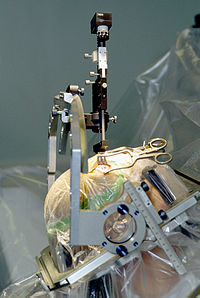
Photo from wikipedia
PURPOSE Partial hand amputations are devastating injuries that often negatively affect individuals and communities. Partial hand prostheses can mitigate the burdens of living with an amputation, especially when reconstruction alone… Click to show full abstract
PURPOSE Partial hand amputations are devastating injuries that often negatively affect individuals and communities. Partial hand prostheses can mitigate the burdens of living with an amputation, especially when reconstruction alone cannot restore form or function. However, hand surgeons may be unfamiliar with these newer devices because the prosthetic field is rapidly progressing. METHODS An electronic survey was distributed to hand surgeon members of the American Association for Hand Surgery with the intent of assessing surgeons' familiarity with partial hand prosthetic devices and their clinical applications. Survey items used Likert 5-point scales, rank order, multiple-choice, and yes/no question formats. Responses were compared by training background (orthopedic or plastic surgery) and by years of experience (≤10 years in practice or >10 years in practice). RESULTS Overall, hand surgeons are unfamiliar with modern partial hand prosthetic devices. Most of the cohort denied working within a multidisciplinary hand team (76.2%) or consulting with a prosthetist prior to revisional surgeries (71.4%). Restoring gross motor function and reducing pain were important outcomes to the cohort (4.42 and 4.17, respectively). Plastic trained hand surgeons were more likely to list toe-to-hand transfers as treatment options for multilevel digital amputations (P = .03) and transmetacarpal amputations (P = .02). Senior hand surgeons were more likely to suggest no treatment for partial thumb amputations (P = .02). CONCLUSIONS Expanding surgeon knowledge and encouraging collaboration within a multidisciplinary team may enhance amputee care.
Journal Title: Hand
Year Published: 2022
Link to full text (if available)
Share on Social Media: Sign Up to like & get
recommendations!